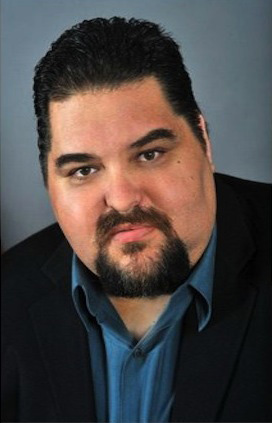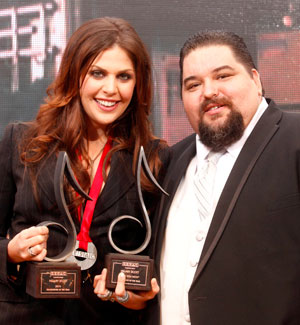

Tim Fink
Tim Fink was playing in a band, running live sound and studying music education at the University of Wisconsin-Whitewater when a friend told him about a college that offered a degree in audio engineering. It piqued his interest and in the late ’80s Fink made a life-changing move to Tennessee and enrolled in MTSU’s music production program. He expected to return to his hometown Chicago after graduation, but a job at SESAC changed his course. “Little did I know that it would turn into a career for me,” he says.
Today SESAC has around 150 employees, with their headquarters in Nashville and additional offices in New York, Los Angeles, Atlanta, Miami and London. Fink serves as Vice President, Writer/Publisher Relations and is approaching his 25th year at the performing rights organization.
What was your first position at SESAC?
My first job at SESAC was on the opposite side of the business. I see us as having two sides: licensing and affiliation. I started in licensing and administration which included reviewing radio station spot rate information, one of the determining factors in their license fee. Shortly after that, SESAC needed help in affiliation so I got to work on both sides of the company. It was amazing because nobody did that, and it’s really when my relationships with the writers started. This developed into me coming into the writer/publisher department full time. The rest exploded from there.
What has been a key to your success in the music industry?
There have been a lot of people I have looked up to in my career, whether they knew it or not. What I have developed from watching other people and the way they’ve done things is pretty simple for me. Treat people the way you want to be treated. That’s the way I chose to be. It’s one of the things that has brought success my way, treating people fairly and taking care of them.
What are some of the high profile signings and accomplishments you have been most excited about during your career?
To this day, it still excites me to honor a writer who has not received an award before. When I signed Hillary Scott, Lady Antebellum didn’t exist. So it was exciting for me to be able to hand her her first plaque. It’s not always just about the high-profile writers. A lot of people have a tendency to overlook successes, and it’s about celebrating the little accomplishments. When a new writer that has never had a ‘hold’ before gets that hold, it’s a step in the process and it should be celebrated. Whether big or small, I love celebrating my writers’ accolades.
How has SESAC evolved during your career?
At the end of the day, the three societies all have to do the same thing. Regardless of how we do things differently, it’s our job to represent our songwriters’ performance rights. If we don’t keep our writers and publishers happy, they go away and so do we. We have to do things that are going to be beneficial to them. We can’t do it the same as anyone else, we have to do it better. When we went to fingerprint technology, we saw an industry in performance rights that essentially hadn’t changed in fifty years in the way they were tracking radio and distributing money. It was an opportunity for us to bring technology into the game. Going to monthly distribution was a big part of it, as well. When we decided to go to monthly distribution, we asked, “How can we benefit our writers and our publishers?”

Hillary Scott and Tim Fink
Looking back over your career, give me an example of when you thought, “Wow! This is really cool.”
When I started here, I would go to various events and I would hear “ASCAP and BMI” or “BMI and ASCAP” and it irritated me. But to be honest, SESAC wasn’t on the same playing field at the time, and I understand why it was left out. So one of the coolest things for me and it sounds really simple, is the fact that I’ve been a part of this organization getting it to a point where now it is more likely to hear “SESAC, ASCAP and BMI” in the same sentence and it is the exception to not hear SESAC mentioned in that same breath. We were a quiet little company. That is very different today. We are a legitimate player in the performing rights world. The respect that we have in the world of performing rights is greatly different than what it was twenty years ago. Our involvement on Capitol Hill is very different than it was in 1990.
What is SESAC’s philosophy in signing new writers for representation?
It’s important to me to let people know that there’s very much an open door policy here at SESAC. A lot of people say we are a selective organization and some people think that’s a closed door mentality, but it’s not. It’s an open door mentality. We look for people who have a need for performance rights representation. I don’t need to sign the guy who is writing music in his garage and playing it for his parents. That person doesn’t need performance rights representation. The way we go about doing business is very strategic. The way we make decisions across the board are generally in the best interest of the writer. My barometer is always about the writer. With signing people like Zac Brown or obtaining the Kurt Cobain catalog; those types of deals are very strategic. There’s a lot more strategy behind what we do than just throwing the dart at the dart board.
What is the most important advice you give your writers?
You’ve heard it before, “Write, write, write.” When you’re done writing that one, write another one. There is so much more involved in getting a song out there than just having a great song. Always do things for a purpose. Don’t do something just for the sake of doing it. Put yourself in places where opportunities can be created. A very simple example: Don’t write at home in your bedroom. Come to the writer rooms. Go to your publishing house. I guarantee that you’re not going to meet somebody in your kitchen when you’re getting your coffee in between verses, that may create an opportunity for you. I will finish it with saying, “Write, write, write.” You’ve got to have the goods.
The Nashville music industry has really been beat up this year, particularly when looking at the lackluster sales. What is your perspective on all of the challenges we are facing? How do you approach it?
I think there have been more changes in the last eight years than in the last fifty. Things are changing so much faster than they used to. This industry has always been in the game of catch up because we have been afforded that luxury. Today? Not so much. We have to put ourselves out in front of these things. I still remain an optimist. I still think the greatest days of this industry are ahead of us. Maybe part of that optimism is what we’ve done at SESAC. There’s ways to look at things differently and that’s what we’ve done. Yes, there’s a lot of things to still be worked out and there will be changes. But the songwriting vocation will still be as strong as ever and there will be ways for writers to make a living doing this. There are a lot of issues out there right now, but I’m optimistic that we will get through them.

Category: Exclusive, Featured, Organizations, Publishing
About the Author
Sherod Robertson is President and Owner of MusicRow Enterprises. He oversees all operations and develops strategic initiatives for MusicRow magazine, RowFax, and MusicRow's CountryBreakout chart. Robertson previously served as Director of Finance of Arista Records after beginning his career as Vice President of Finance and CFO at Reunion Records.View Author Profile


